Course Information

Welcome to the Colorado Outward Bound School! This is a place of challenge, learning, and community and we’re so glad you’re joining our crew. As you’re getting ready for your course experience, we wanted to share with you a bit more about what to expect. A COBS course is designed to provide students with the opportunity to face new challenges in a supportive environment; to find success through mistakes; and to navigate through adversity with compassion for self and others. The breathtaking mountains, rivers, and canyons of Colorado and Utah are our classroom. And the life lessons are as limitless as the views.
As in all of life’s adventures, elements outside of our control may require adjustments to the details and we often adapt our itineraries to meet dynamic environments, but one thing’s for sure: we’re going to connect with new people, try new things, and explore some amazing places together. Here at COBS, we believe there is more in you than you know and we’ll use the inherent beauty and challenge of the natural world to test our comfort zones and to discover opportunities to work hard, learn, and reflect. And the memories you’ll take home will last a lifetime. Read on and we’ll see you soon!
CCTA-321: Colorado Rockies Alpine Backpacking
Course Code: CCTA-321
Start Date: 6/26/23
End Date: 7/3/23
This backpacking course takes place in the Rocky Mountains and focuses on the art of traveling light, exploring the natural world and becoming a high functioning team. During the course, you can expect to travel on and off trail and over wooded and alpine terrain at 9,000 feet or higher, which can be rough, steep and exposed. Learn smart and efficient backpacking and alpine travel techniques as well as Leave No Trace camping and travel skills, outdoor cooking techniques, basic first-aid, map and compass use, route finding and how to use an ice axe if necessary. Backpack through the alpine environment and attempt a peak ascent. As the course progresses and your skills and experience increase, your Instructors will turn more and more responsibility over to you and your crew.
Alpine Backpacking
Alpine Backpacking will develop a foundational outdoor skillset for students allowing comfortable living during course. Traveling mostly above treeline, students will carry everything they need - food, shelter, clothing and gear – allowing them to go deep into the mountains where few people can reach. Backpacking provides a sense of freedom, allowing students to eat when hungry, set up camp when tired, and exercise complete control over what is accomplished each day. The simplicity of backpacking gives students the opportunity to focus both internally on their own thoughts, as well as externally to connect deeply with others as they talk, sing, play games and spend time together without distraction. With the Rocky Mountains as a backdrop, students are introduced to backpacking with lessons in basic travel and camping techniques. As this section progresses, students learn Leave No Trace techniques, map and compass navigation, camp craft, and obtain an understanding of the area’s human and natural history.
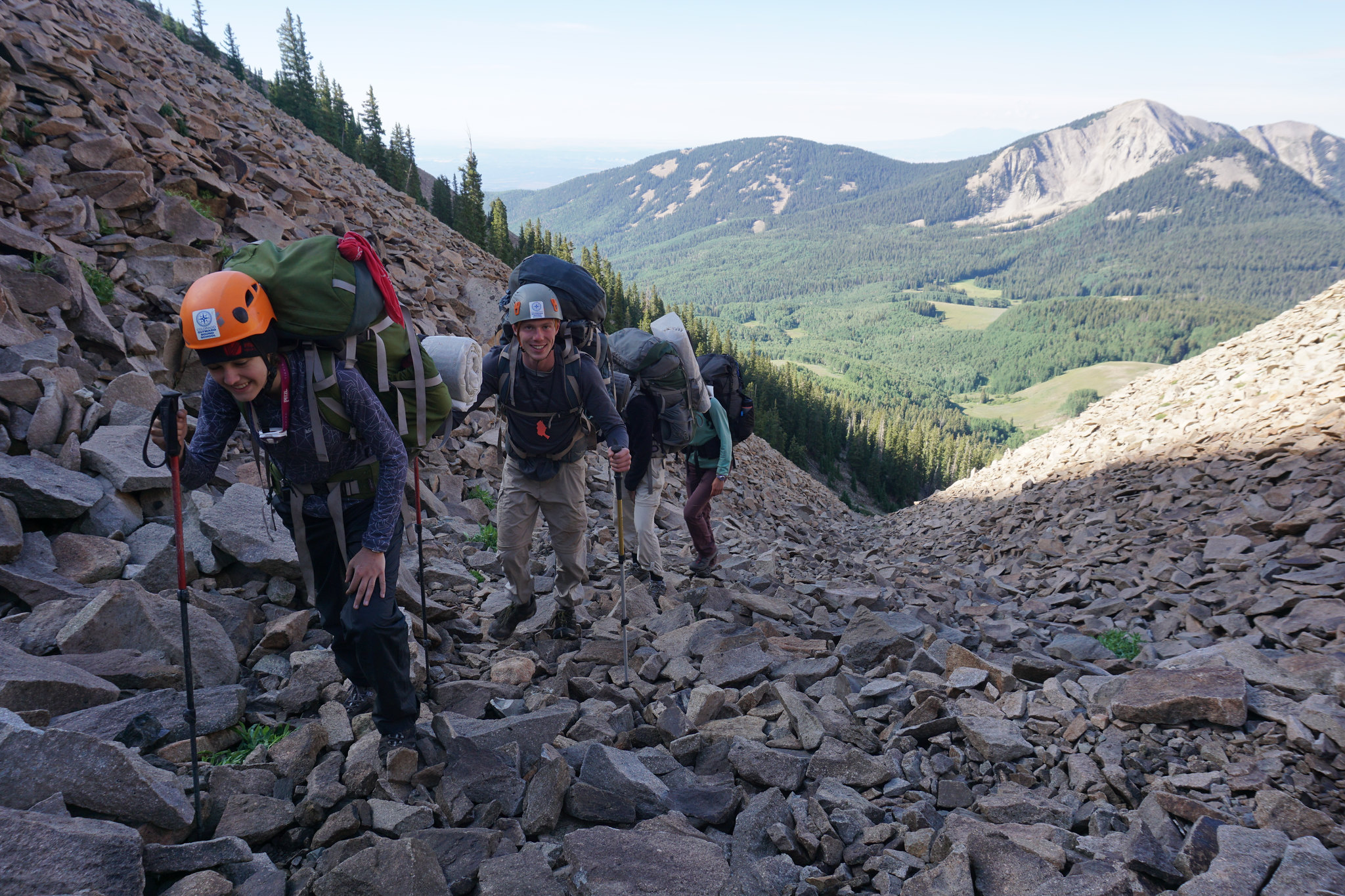
Photo: Dave Erbe |📍Núu-agha-tʉvʉ-pʉ̱ (Ute) lands
Guided Reflection and Transference
At Outward Bound we believe there is no learning without reflection. Throughout course, you will be prompted to reflect on what you’re experiencing on course, and what it means in the greater context of your life. Sometimes this is a journaling exercise, sometimes a group sharing experience, and sometimes a moment of solitude to sit and think. You spend focused time toward course progression end exploring how your new knowledge, skills and attributes can apply to your life after course.
High Ropes Course
Swaying in the lodgepole pine trees of the Leadville Mountain Center, our High Ropes Course offers individual challenges to unlock the potential in each group member. The Ropes Course has an array of elements and many opportunities to return to the ground, allowing students to choose the right amount of challenge for them. Traveling through the tree 40 feet above the ground while wearing harnesses and safety gear, students rely on their crewmates for support as they navigate exciting obstacles like swinging bridges and rope nets. Instructors and group members are always close by to encourage and help one another and to ensure safe transfers from one element to the next.
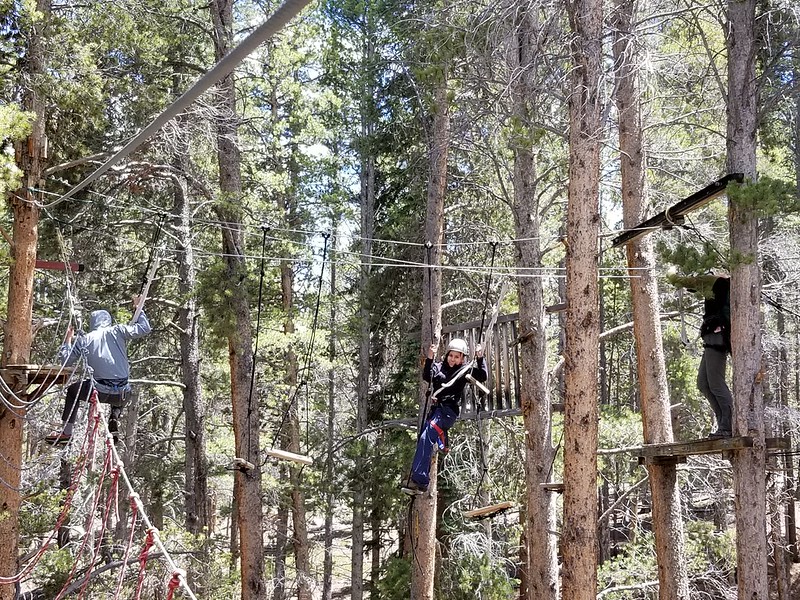
Photo: Anthony Capristo |📍Núu-agha-tʉvʉ-pʉ̱ (Ute) lands
Solo
Solo is a time when you’ll get the opportunity to spend time alone during course. With sufficient food and equipment, your Solo will be a chance to reflect on your course experience, journal, and connect with nature. Depending on your course length and environmental factors, Solo can range from 30 minutes to an overnight experience. You will not travel during this time and your Instructors may check on you occasionally. Your solo site will be close enough to your Instructors in case of emergency, but far enough removed to enjoy solitude. Many students are initially nervous about solo, but later recall it as one of the highlights of their course.
Peak Attempt
Peak Attempts present an opportunity for challenge, teamwork, and the need to pull together all of your learned skills for success. Your expedition will include at least one peak attempt. Peak attempts are major enterprises and typically require early morning starts and can take all day to complete. Weather, or other factors including group dynamics and physical readiness, may preclude even an attempt to ascend a peak.
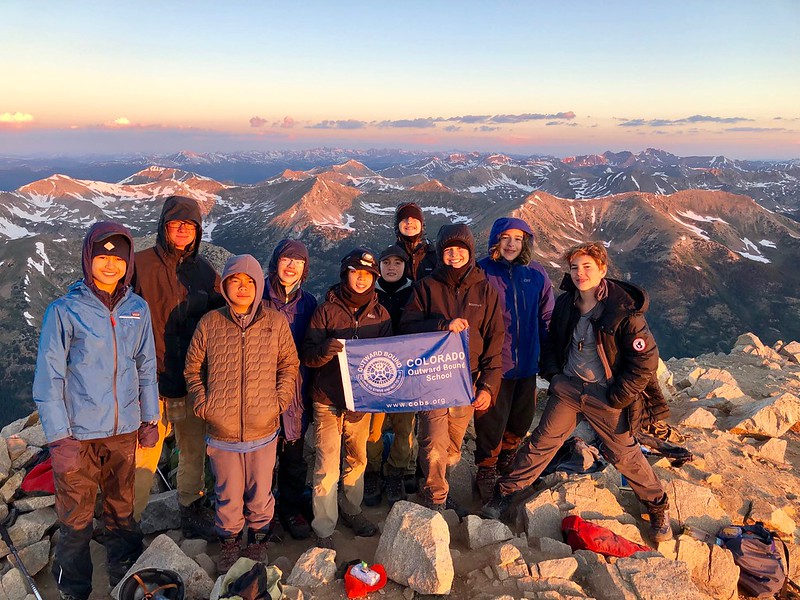
Photo: Naomi Winard |📍Núu-agha-tʉvʉ-pʉ̱ (Ute) lands
Service
Service is a pillar of the Outward Bound experience. On each course, students learn to practice intentional service to themselves, to others and to the environment. This may look like practicing self-care or supporting a crewmate who is having a hard day. Participants also learn to Leave No Trace ethics, practicing service to the environment by preserving and respecting the fragile ecosystems they encounter. Students experience firsthand the social and emotional benefits of acts of service. They are encouraged to bring this ethic of care to their life back home.
Ground Initiatives
To develop skills in problem-solving and teamwork, your Instructors will progress your group through a series of fun and physically engaging outdoor activities. Students will be actively engaging with the physical environment and each other to achieve goals. You’ll discuss how different styles of leadership and communication lead to different outcomes. Instructors will match appropriate initiatives to your group’s needs. Group reflection will focus on core course components like belonging, courage, and transferring skills and lessons learned to life back home. You group will then take your newfound skills and insight to the low ropes course.
Low Ropes
Together the group will navigate obstacles like logs, rope swings, and platforms just a few feet above the ground to practice leadership and problem-solving. Students gain confidence as they explore different leadership styles and learn the importance of listening and supporting one another. Reflection after each activity helps students connect their experiences to real-world scenarios, facilitating educational transference to the classroom and beyond. The Low Ropes course deepens the group’s ability to communicate and work cohesively.
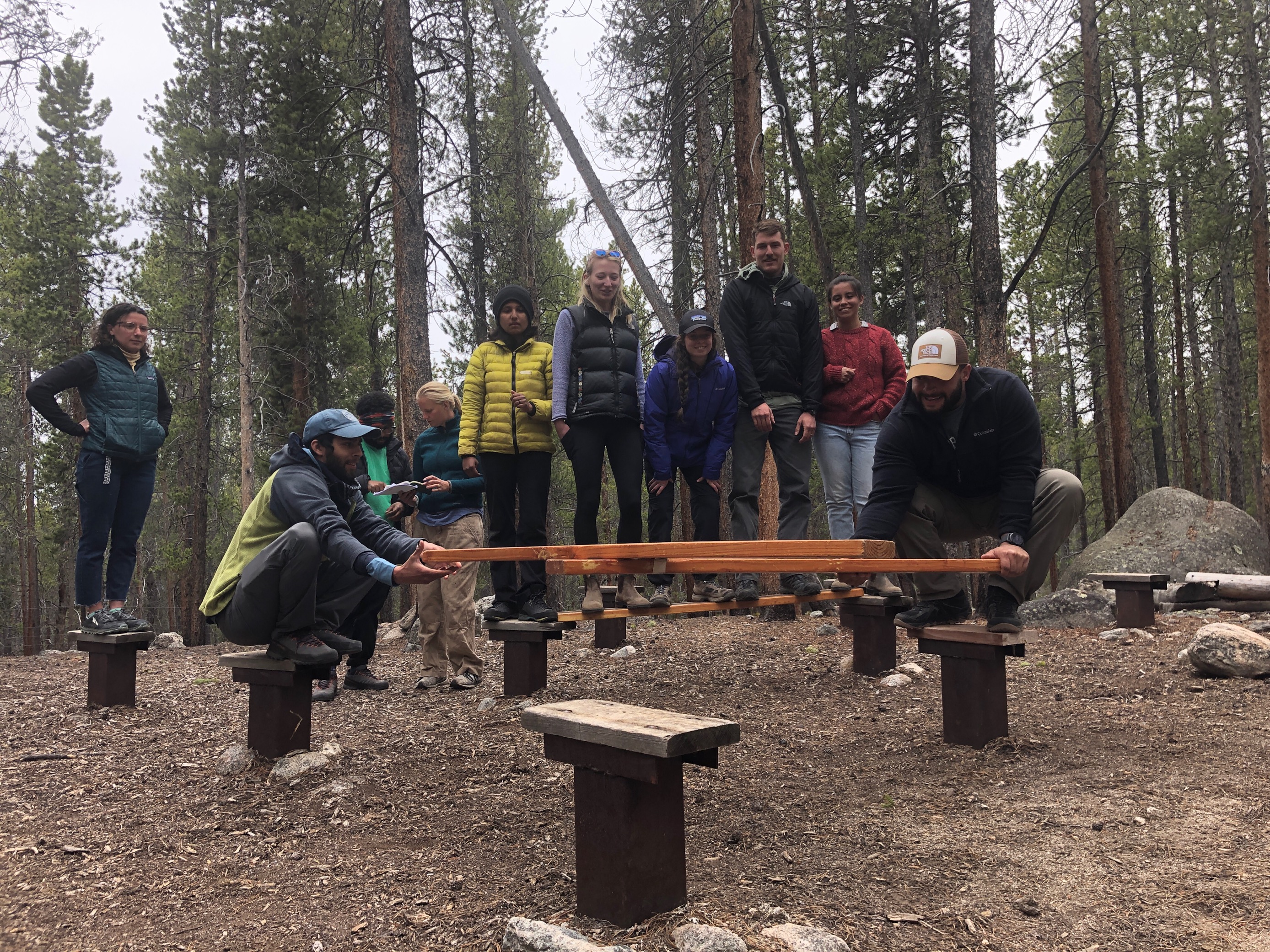
Photo: Leslie Spinelli |📍Núu-agha-tʉvʉ-pʉ̱ (Ute) lands
Our expeditions help students grow into the best version of themselves. We use adventure in the outdoors to help students discover their strengths and build authentic connections with their peers. Compassion for oneself and others is foundational to the Outward Bound experience. As students develop outdoor skills, they also gain confidence and leadership tools that will last a lifetime. Course outcomes include:
- Belonging – students form deep connections founded upon respect, inclusion, and compassion
- Reflection – students learn self-awareness and practice empathy towards others
- Physical Engagement – students develop awareness and confidence in their bodies
- Courage – students develop the confidence to speak up for themselves and persevere through challenges
Watch to Learn More
Sawatch Range, Colorado
The Sawatch sub-range of the Colorado Rockies is home to Colorado’s two highest peaks: Mt Elbert (14,439’) and Mount Massive (14,429’). The range is known for expansive, rolling alpine terrain and multiple high peaks, and encompasses the headwaters of the Arkansas River. The source of the name is somewhat disputed but some source it to Ute words meaning “green place” or “blue water.” These regions are within the ancestral lands of the Núu-agha-tʉvʉ-pʉ̱ (Ute) nation.
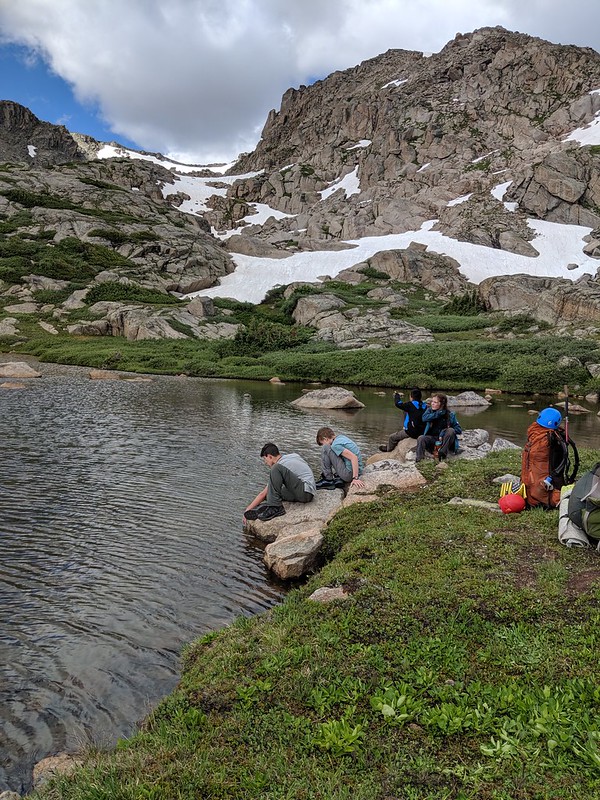
Photo: Terence Copeland |📍Núu-agha-tʉvʉ-pʉ̱ (Ute) lands
Leadville Mountain Center, Colorado
Colorado Outward Bound’s 600-acre property at the base of Mount Massive. Our base camp encompasses mountain streams, wild plants, fields and forests. Lake Fork Creek (that runs into the headwaters of the Arkansas River) runs near the east of our property and the Colorado Trail borders us to the west. If the timing is right, colorful wildflowers will brighten the trails through the LMC. You might share camp with elk, deer, chipmunks and myriad other wildlife. This region is within the ancestral lands of the Núu-agha-tʉvʉ-pʉ̱ (Ute) nation.
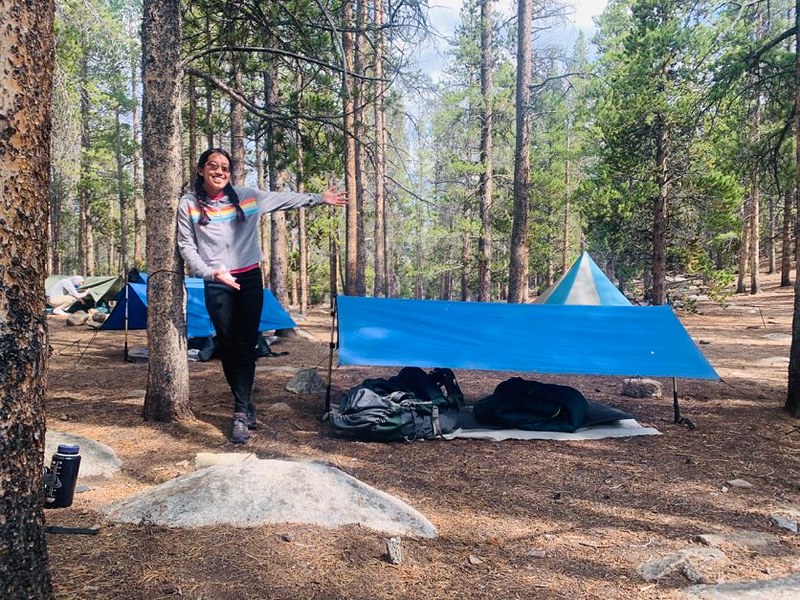
📍Núu-agha-tʉvʉ-pʉ̱ (Ute) lands
Rocky Mountains, CO
The Colorado Rockies is home to the most high peaks in the lower 48 states, with hundreds of iconic mountains standing over 13,000 and 14,000 feet tall. The region is characterized by dense pine forests and rocky alpine ecosystems. Students will enjoy clear blue glacial lakes, fields of wildflowers, waterfalls, and striking rock formations. If they are observant, students may spot wildlife like elk, mountain goats, moose, marmots, pikas and eagles. These regions are within the ancestral lands of of the Núu-agha-tʉvʉ-pʉ̱ (Ute), Cheyenne, Arapaho, Očeti Šakówiŋ (Sioux), Eastern Shoshone, Jicarilla Apache, and Pueblos nations.
What is a land acknowledgment?
At the Colorado Outward Bound School, we include land acknowledgments in our work as a formal way to recognize and respect the traditional territories and Indigenous Peoples as stewards of the land. It is important to understand and acknowledge the comprehensive past, present, and future of the places we travel and to seek to understand our role therein. To recognize the land is an expression of gratitude and appreciation we give to the Indigenous Peoples who have been living and working on the land from time immemorial. Read more about land acknowledgments at Outward Bound here.
The following is an example of what your itinerary may look like. Your actual course plan will vary according to weather, your group’s skills and abilities, and Instructor preferences.
Day 1: Course Start, gear distribution, & backcountry sleeping
Day 2: Low ropes & initiatives, High ropes course, preparation for backcountry travel
Day 3-6: Backpacking, group development, Peak Attempt, Solo experience, & adventure
Day 7: Deissue gear & closing ceremony
Day 8: Student depart and travel home
Click here for COBS COVID-19 Program Practices
Tuition
You can pay your tuition online through your Applicant Portal or make the payment over the phone by calling 720-381-6589.
If your payment is not received by the due date listed in your Enrollment Email and on your Applicant Portal, you will risk losing your spot on course and your $500 deposit. Please review our Admissions and Cancellation Policies.
Travel Insurance
Airfare, travel costs, and non-refundable tuition payments are expensive. Insurance to protect your trip and course is strongly encouraged. We recommend insuring these costs from the third-party provider InsureMyTrip. This provider has coverage options that include travel costs and non-refundable tuition costs. For more information and to receive a free quote, click here.
Everyone who participates in a course must read these documents before attending
Please bring everything on the required clothing and gear list, but do not feel like you have to buy everything new. Many of these items can be found second hand at thrift stores, consignment shops, and online like eBay and Facebook Marketplace
Packing for backcountry travel is all about packing light and practically. Every day, you will be carrying all your gear, food, and water. So the lighter your load, the more comfortable you'll be! That's why we ask that students bring everything on the required gear list (and whatever you'd like to bring from the optional items list), but nothing more. Most experienced backcountry travelers will tell you that they bring about the same amount of gear on a three-day trip as they would on a three-week trip.
Important Packing Information
- Pack your clothing and gear in a duffel bag or suitcase. You will keep personal items such as clean clothes for your return trip home and valuables (cell phones, electronic devices, and wallets) in this bag while you are on course. Please leave unnecessary or expensive items at home.
- Once you arrive at base camp, your instructors will help you pack for backcountry travel. They will assess your personal gear, the group gear you will be required to carry, and help you adjust your pack as needed.
- We encourage you to leave the tags on any items you purchase for this course. That way, you may return these items if you do not use them on your expedition.
- Please bring everything on the list! If you have questions or concerns, we encourage you to reach out to your course advisor.
Medications:
- All prescription medications must be listed in the applicant’s medical record, must be approved by your course advisor prior to course, and must accompany the participant on course. Participants may not be permitted to begin their course without their required medications OR with new medications not approved by your course advisor.
- All medications (prescription, non-prescription, and OTC) must be in their original containers with the prescription label intact. The prescription label is documentation of the dosage directions. If possible, bring a double supply.
What to Wear While Travelling:
We recommend you wear course clothing and boots while travelling and bring all essentials (prescription meds, insurance card copy, cash) in a carry-on. This will minimize the inconvenience in the unlikely event your luggage is delayed in transport. Being dressed for course will also further the efficiency on your first day, especially since front country bathrooms and private changing areas are rarely available.
Gear that Outward Bound Provides
Outward Bound provides all other equipment needed that is not on the required packing list. There are no additional fees for the use of our equipment. If you have your own equipment that meets the criteria below, you are welcome to bring it with you. Your instructors may ask you to use Outward Bound gear in lieu of your own if it does not meet our criteria below.
If you do wish to bring some of your own gear, here are the standards for what may be acceptable
- Sleeping bags – need to have a 15-degree warmth rating or warmer. Synthetic filled bags have the advantage of being warm even when wet. Down-fill sleeping bags are not appropriate for this course due to the wet conditions found in the backcountry. Should weigh less than 5 lbs.
- Sleeping pads – can be ¾ to full size in length. They can be made of closed-cell foam or inflatable. Inflatable pads must have insulation and please bring a patch kit.
- Expedition Backpacks – need to have a minimum capacity of 80 liters, should carry 45-60 lbs. comfortably. Side pockets are also a useful option.
Layering:
- First layer—This layer is worn next to your skin. Synthetic and wool materials are best for this layer.
- Mid layer(s)— This is the insulation layer. Think thick tops, leggings, wool socks, and fleece jackets.
- Outer layer— This is the layer that will protect you from the wind, snow, and rain. Outer layers are completely waterproof not just water resistant.
Materials:
- Hard Shell: Waterproof and windproof, generally worn when it’s raining, snowing, or really windy.
- Soft Shell: Water and wind-resistant. Not waterproof but more breathable than hard-shell.
- Fleece: Great insulator and dries quickly.
- Wool: Natural material that, unlike cotton, keeps you warm when wet.
- Synthetic: Almost anything else but cotton! Acceptable non-cotton options are wool, capilene, poly-propylene, polyester, fleece, acrylic, rayon, Polartec, Thinsulate, COOLMAX, and nylon.
Still confused? Check out this video about fabrics from our friends at NCOBS.
Rain Pants and Rain Jackets:
Although Colorado and Utah have a reputation for lots of sunshine, it rains frequently in the backcountry! Having high-quality waterproof gear that will keep you dry will be very important.
Please read our Guide to Picking the Right Rain Gear to make sure you pack the right waterproof gear.
Head & Hand Layers:
| Quantity | Item | Description |
| 1 | Baseball Cap |
Necessary for sun protection; full brimmed hats do not work well with backpacks. |
| 1 | Warm Hat |
Wool or fleece beanie that can be worn under a helmet. |
| 1 | Midweight Gloves |
Should maintain warmth and be weather resistant. To wear in colder temps. |
| 1 | Buff | To be worn when close to others during activities. |
Top Layers:
| Quantity | Item | Description |
| 2 | Sports Bra |
Sports bra should be able to provide support in physical activity. |
| 2-3 | Short Sleeve T-Shirt |
Outermost shirt, must be comfortable during walking, hiking, and other course activities |
| 1 | Long Sleeve Shirt |
UPF materials are recommended. Loosefitting, long sleeves. Long sleeve button up shirts and sun hoodies also work to keep you warm and provide sun protection. UPF materials are recommended. |
| 1 | Long Sleeve Mid Layer |
Worn on top of baselayer for insulation. Soft, long sleeve technical fleece, (hood optional). Lightweight, compact, and moisture wicking. |
| 1 | Long Sleeve Base Layer |
Base layers are the first layer of clothing to provide warmth while absorbing and evaporating sweat to keep student warm and comfortable. |
| 1 | Insulated Jacket |
This is a puffy, lightweight jacket with a hood to optimize warmth. Will be worn as outermost layer in dry conditions. |
| 1 | Rain Jacket |
Should be waterproof, not water resistant. Should be helmet compatible and loose fitting as to go over all you other layers of clothes. |
Bottom Layers:
| Quantity | Item | Description |
| 3-4 | Underwear |
Comfortable underwear for physical activities. Cotton underwear is recommended for sleeping (bring at least one pair). |
| 1 | Shorts |
Athletic shorts that wick moisture and dry quickly. |
| 1 | Pant Base Layer | Base layers are the first layer of clothing to provide warmth while absorbing and evaporating sweat to keep student warm and comfortable |
| 1 | Insulated Pants | These pants can be down, fleece, or synthetic insulation full side zips on these pants are useful in the backcountry. For keeping warm at camp on cool days and evenings, great for layering. |
| 1 | Hiking Pants | Medium weight, loose fitting pant; These will be your most used pants. |
| 1 | Belt |
Easily adjustable synthetic belt. Something that will fit smoothly under your backpack hip belt.. |
| 1 | Rain Pants | Should be waterproof, not water resistant. Should be loosefitting as to go over all you other layers of pants. Lower leg zippers recommended. |
Footwear Layers:
| Quantity | Item | Description |
| 1 |
Thick Hiking Socks |
Important for very cold days, sleeping, and being at camp. Make sure new boots are fitted with the thickest socks |
| 3-4 |
Hiking Socks |
Basic wool hiking sock; crew to ski-length socks |
| 1 | Boots |
The most essential piece of gear that you will purchase. Must be waterproof, have good tread, a sturdy non-flexible sole, and at least mid-ankle in height. * Please read this blog on choosing boots for more information. |
| 1 | Running Shoes |
This will be your dry, comfortable, camp shoe. It should be somewhat lightweight and sturdy. |
Toiletries:
| Quantity | Item | Description |
| 1 | Waterproof Sunscreen |
SPF 30 or greater. For courses 15 days or longer, consider bringing a small bottle to carry and a larger bottle to resupply from. |
| 1 |
Lip Balm |
SPF 30 or greater |
| 1 | Insect Repellant |
Must be a cream or lotion. 2-4 oz., plastic container. Products with Picaridan or DEET (10 - 35%) are most effective.. |
| 1 |
Moisturizing Lotion |
4-6 oz. per week for dry feet and hands |
| 1 | Toiletry Kit |
Travel-size toiletries for basecamp use, if showers are an option. |
| Menstrual Products |
Choose the method you are most familiar with and bring extra supplies. Regardless of your choice, take into consideration that you will have to pack out all waste. Menstrual cups produce less waste. If you’ve never used a menstrual cup, we recommend you try it before course. If using tampons, consider a non-applicator tampon to reduce bulk and waste. |
|
| 8-10 | Wet Wipes |
For extra cleaning and hygiene.. |
| 1 | Towel | For showering at basecamp. |
Personal Accessories:
| Quantity | Item | Description |
| 1 | Luggage Bag |
Large duffle bag or suitcase for travel to and from course. |
| 1 | ID & Insurance Card |
Bring your card if you have insurance. The actual card is preferred, but a copy of the front and the back of the card will be okay. Store in ziplock bag.. |
| 2 | Bandana |
Bring extra if intended to use for backcountry hygiene including as a pee rag. |
| 1 | Sunglasses with keeper strap |
Sunglasses with UV protection. For winter, or courses expected to travel significantly on snow, peripheral coverage and dark lenses are important to protect from the additional sun glare. |
| 1 | Prescription Eye Wear + Extra Glasses and/or contacts |
Contacts – bring extra pairs Glasses - Ensure these are compatible with your sunglasses. Bring an extra set in case of damage or backup. |
| 2 | Water Bottles |
Two wide-mouth 32 oz. water bottle. A hydration bladder is not recommended for river courses or sections with freezing temperatures. |
| 1 | Headlamp |
LED headlamp with extra batteries - lithium batteries recommended. |
| 2 | Prescription Medications including Asthma Inhalers |
THESE MUST BE DECLARED DURING THE APPLICATION PROCESS. Bring medications in original containers (name, dosage, and instruction labels should be listed). Bring a ziploc bag for storage. Bring two sets of medication in case original is lost or damaged. |
| 1 | Watch |
Digital and water resistant recommended. |
| 6+ |
Sealable Plastic Bags |
Heavy duty to protect cameras, use as trash bags etc. Sandwich or gallon sized. |
Travel to and From Course:
| Quantity | Item | Description |
| Money & Snacks |
Extra cash and snacks are recommended for travel days and unexpected expenses such as luggage fees, bus fare, etc. |
|
|
Emergency Contact Numbers |
Carry a copy of the COBS phone numbers to use in case of travel delays | |
| Clean Clothes | Please bring a set of clean clothes for your travels home. |
Optional Items:
| Quantity | Items | Description |
| 1 | Vest | To be worn as an extra layer for core body warmth. |
| Stamps and Envelopes | If you would like to send mail, bring your own stamps and envelopes. Store it in a ziplock bag. | |
| 1 pair | Gaiters | COBS provides a basic pair of gaiters. Higher end gaiters may provide more coverage and may be easier to use. |
| 1 pair | Hiking Poles | COBS provides basic poles. You may bring your own pair if you prefer. |
| 1 | Camera | Each patrol will have a COBS provided camera. If bringing your own, keep in mind the bulkiness and level of care needed to maintain the camera. |
| 1 | Insulated cup | ½ liter size, maximum. Nice for hot drinks. |
| 1 | Toys, Instruments, Books |
You are welcome to bring hacky sacks, frisbees, musical instruments, and other fun stuff. You will only have access to these items for certain, limited times. |
| 1 | Cell Phone & Charger |
You will have a chance to use your phone at course start and end. |
| 2+ | Ear Plugs |
Recommended if you are a light sleeper. |
| 1 | Inflatable Sleeping Pad |
COBS provides an insulated foam pad. If bringing an inflatable pad, it must be lightweight, and have appropriate R-value for the cold. Patch kits required if bringing an inflatable pad. |
| 1 | Portable Chair | Crazy Creek and REI are popular brands. Must be lightweight and packable/rollable. No chairs with legs can be brought. |
| 1 | Backpacking Water Filter | COBS treats water with Aquamira, bleach, or by boiling. If you prefer a water backpacking filter you must bring your own. |
Items not Allowed on Course:
- Electronics—cell phones, iPods, etc. These may be brought on the plane or bus but will need to be stored at the base before going into the field.
- Deodorant, makeup, shampoo, conditioner, perfume, cologne, etc.
- Illegal drugs, any CBD/THC products, alcohol, vapes, tobacco products of any kind, and nicotine.
- Any prescription drugs not cleared by your course advisor.
- Weapons of any kind.
Weather During Your Course:
You can expect temperatures between 40°-80°F during the day and 15°F-40°F at night. Weather in the mountains can be unpredictable, which is why it is essential to pack everything on the required gear list. Please check the weather prior to your course for Leadville, Colorado at www.weather.com to have an idea of what to expect. If you tend to get cold easily, we encourage you to make sure your base layers, hat and gloves are extra warm! Once you arrive at course start, your instructors will update you on current weather patterns and advise you on what clothing will be appropriate.
MEETING PLACE:
1:30 PM Mountain Time
Denver International Airport (DEN) Baggage Claim –10 Terminal West Jeppesen (Main) Terminal, Level 5
Meeting Time: 10:30 AM - 1:30 PM MT
We will have a table set up against the windows across from baggage claim 10. We will be in between door 516 and the clear plus station.
If you are flying in, take the train to baggage claim by following the signs. After you get off the train you will take an escalator/elevator to the baggage claim area. Follow the signs to baggage claim 10 in terminal west.
If you are being dropped off in-person, please plan to arrive at 10:30 AM. DEN is a big airport, so make sure to leave yourself plenty of time for foot travel and parking.
Before departing, we will do a roll call to ensure all participants have arrived. Parents will only be notified if a student does not arrive as expected.
If you encounter problems with your travel plans that will delay your arrival to Denver, we can help troubleshoot solutions to get you to course start.
Call us at 720.381.6589 and continue to follow the directions for a travel emergency on a Colorado course. If you are leaving a voicemail, please leave your name, course number, and call-back number.
Course End:
After breakfast, a van will transport participants back to Denver International Airport (DIA). Students should arrive back to Denver International Airport at approximately 10:00 AM. Outward Bound staff will be available in the airport to assist students until 4:00 PM. We strongly encourage all students to bring cash or a card for purchasing food or paying a bag fee. We cannot guarantee that students will be able to make a flight departing before 12:30 PM.
For those who are being picked up at DIA, participants can be picked up at Baggage Claim 10 between 10:30 AM – 11:00 AM. This is the only location students can be picked up from.
TRAVEL AND TUITION INSURANCE
Airfare, related travel costs, and non-refundable tuition payments are expensive. Insurance to protect your trip and course is not required but strongly encouraged. We recommend insuring these costs from the third-party provider InsureMyTrip. This program has coverage options that include your travel costs and the non-refundable tuition costs. For more information and to receive a free quote, click here.
TRAVEL PROBLEMS AND EMERGENCY CONTACT:
If you encounter problems with your travel plans that will delay your arrival to Denver, we can help troubleshoot solutions so that you can get to your course start. During office hours, call your course advisor for assistance. After hours, call our 24-hour voice mailbox at 720.381.6589 and follow the prompts for a travel delay on a Colorado program. The mail boxes are checked regularly and you will receive a call back as indicated by the outgoing message. In the event of an emergency (such as a death in the family) where you need to reach a student who is on course call 720.381.6589 and follow the prompts for critical emergency for a student currently on a course. This will route to an on-call cell phone and you will get a prompt return call as indicated by the message.
ACCOMMODATIONS:
If you arrive before, or stay after your course dates, several hotels offer shuttle service to and from the airport.
Frequently Asked Questions
Click here for college credit registration and instructions for how to use 529 college funds to pay for an Outward Bound course
Acute Mountain Sickness, commonly referred to as AMS or altitude illness, is physical symptoms experienced from difficulty adjusting to reduced air pressure and lower oxygen levels at high altitudes. Not everyone experiences AMS, but anyone can experience symptoms upon arriving at higher altitudes usually on the second or third day at altitude. Symptoms can vary widely and include headaches, nausea, loss of appetite, dizziness, and trouble sleeping. While it is possible to experience these symptoms at lower elevations, AMS typically occurs at 8,000 feet above sea level or higher. Our river and canyon-based courses typically operate at 4,000-6,000 feet, and all other courses usually occur between 8,000 -10,000 feet and higher. While on course, we mitigate the risk of AMS sleeping at lower elevations, ensuring students drink 2-4 liters of water per day, and easing into higher-intensity activities. Here are some things you can do to reduce your risk of getting altitude sickness:
- Arrive early if possible. This will give your body time to adjust to the altitude before course.
- Increase your level of physical activity. While activity level doesn’t directly prevent AMS, you will likely be better able to work through the fatigue associated with altitude if you are more physically prepared.
- Get more rest than usual. Prioritize sleeping as preparation for your course! Give yourself plenty of rest time and 8 hours of quality sleep nightly.
- Show up hydrated. Avoid alcohol for at least 3 days before your course and remember to drink 2 or more liters of water per day. It’s easy to forget to drink on travel days so keep your water bottle handy!
- If you are taking prescription medications, consult your doctor about how altitude may affect them. Sometimes our body’s responses to certain medications can change at altitude.
To learn more about what you can do to prepare for your course visit our backcountry awareness page.
Once you submit your initial application, your COBS Course Advisor will send you an enrollment email that contains the links to your Applicant Portal where you can complete your paperwork and check the status of your application.
A typical day usually means getting up early, making breakfast, mapping the route and then embarking on the day's adventure! You will likely travel all day – taking breaks to rest, snack and enjoy the views. Once you reach camp, you will work with your crew mates to prepare dinner and set up camp. There are many other exciting elements of course including a Solo experience and a Personal Challenge Event. To learn more, check out our Course Life page.
Click here to review our COVID-19 requirements and practices
Let’s be honest – almost everyone gets homesick from time to time! It’s a totally normal part of any adventure away from home.
Being homesick doesn’t always mean missing loved ones. It can also mean missing the comforts of home – like your bed, your favorite meals, and even your phone. Occasionally missing home is a common and healthy experience. But too much homesickness can get in the way of having a good time.
The best way to prevent overwhelming feelings of homesickness is to be prepared before you depart on your adventure. Check out our blog about the steps you can take before course to mitigate homesickness.
MAIL:
Embarking upon multi-week expedition without most of our comforts from home can be an unfamiliar challenge, and receiving letters from family and/or friends can be incredibly encouraging for everyone on an expedition. Your mail will be delivered to you at transfers and resupplies as well as at the end of course. Your family and friends can send mail to you at the following address. Any undelivered mail received after the course will be forwarded to your home address. Please ask them to mail the letters at least 6 days before the course end. Packages are subject to opening prior to delivery to the student.
Name and Course #
c/o Colorado Outward Bound School
1930 Hwy 300
Leadville, CO 80461
If there is no course code on mail, it may be filtered into the staff generic mailboxes, and may not be received during course.
General Hygiene
Your instructors will explain the details of backcountry hygiene when you arrive. Groups carry soap and/or hand sanitizer for hand washing. Every student is given one wet wipe per day. You are welcome to bring and additional personal supply. Sometimes there are creeks, rivers, or lakes that groups can splash around in. Although showering and washing hair are not an option while on course, and there are usually no opportunities to wash clothing, it is not as bad as it sounds and we are all in it together.
Every course environment has different techniques and environmentally appropriate practices for going to the bathroom. You will learn how to dispose of human waste in latrines, cat holes, groovers, or other wilderness-area specific methods.
Getting your Period on Course
Diet, altitude, & fitness level can unexpectedly bring on your period or postpone it. You may experience irregularities while out on course. Choose the method you are most comfortable with such as pads, menstrual cups, or tampons and include extra/supplemental supplies. Many of our staff love a reusable menstrual cup (MeLuna, DivaCup or Lena), because it reduces the amount of waste that you will need to carry and pack out. If you’ve never used a menstrual cup, we recommend you research and trial it before course. If using tampons, consider a non-applicator tampon to reduce bulk and waste that needs to be carried. Feel free to contact your course advisor with any questions. Regardless of your choice, we are able to share practices for managing periods and supplies in the backcountry and provide all the supplies to manage waste.
Attending a Colorado Outward Bound Course, like any big experience, requires some planning and preparation. Check out our page about physically and mentally preparing for course.
Our school offers partial scholarships for individual students that cover 20-30% of the full cost of tuition. The amount awarded is financial need-based, but we also take into consideration how motivated a student is to attend course. We try to help all interested students find a way to make our courses affordable but cannot guarantee that we'll be able to give everyone financial aid. Find more information about our scholarships and academic credit here.
Still have questions? Click here for more FAQs
Sign Up for Updates
Please fill out the form below to begin receiving our email newsletter.


